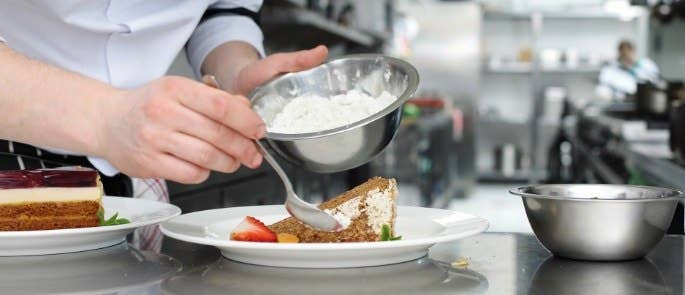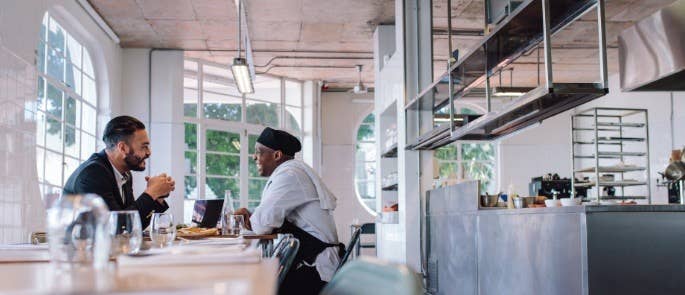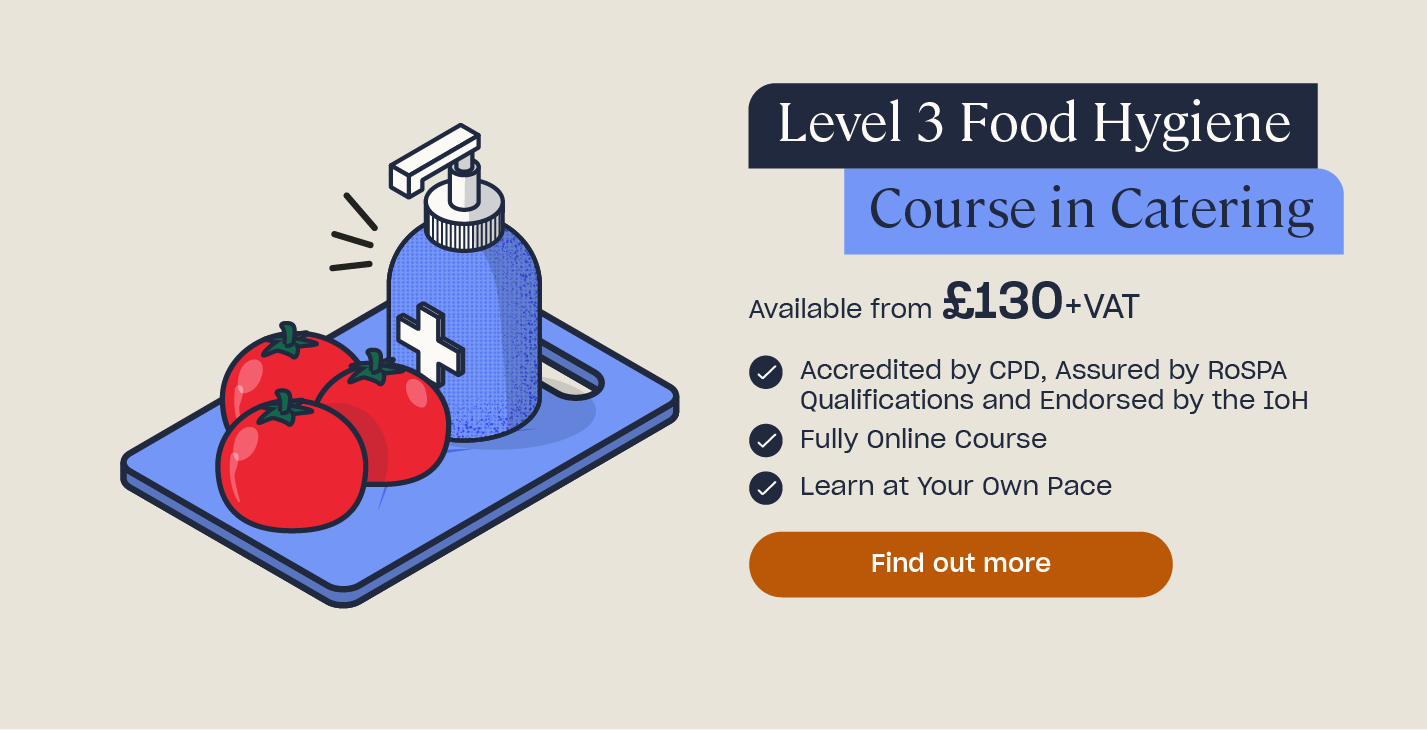Interview Questions for Chefs
There is a high demand for chefs in kitchens with many business owners offering good salaries and extra holiday days to entice good candidates. However, the best jobs out there will draw a lot of applicants, so you need to stand out from the crowd.

Whenever you decide to apply for a new job, it is always a good idea to prepare yourself. Try and have some examples of your previous experiences ready to showcase your strengths.
This article is brought to you by…

Our Sales and Development Manager, Jamie Hogg, who has an extensive background in hospitality. With more than 15 years of experience as a General Manager of several bars, restaurants, hotels and pubs, Jamie has recruited many chefs and enjoys seeing how they develop with the role.

I worked in restaurants and bars for over 9 years before setting up a cafe with a business partner. I’ll use my experience from the shiny, the sharp and the downright bluntest of interviews, to make sure you’re as prepared as possible.
The contents of this article are:
Use the links above to jump to each section of the guide.
Interview Questions for Chefs
Being a good chef requires use of both hard and soft skills. You need to show attention to detail, be able to multitask, have an excellent understanding of cleanliness and allergens as well as cooking techniques and culinary expertise. You may be asked about your ability to cope under pressure, your decision-making ability and your creativity. Senior chefs will also be asked about P&L reports, average GP% and management style.
To help you prepare for your interview, we’ve compiled a series of common questions along with the answers your interviewer will be looking for.
Question: Why do you want to be a chef?
Answer: This question is often asked to establish your passion for your job and what ambitions you have. Think about what it was that made you become a chef. Do you want to produce Michelin star food? Run your own business? Or perhaps you want to write cook books? Whatever it is that drives you, allow your love of food to shine through. Having genuine passion for your career inspires confidence in your desire to do well – a must for any chef.
Question: Who is a chef you admire, and why?
Answer: This is another question where the interviewer is looking for passion, as well as testing your knowledge on the industry. Be aware of key players that are relevant to what you want to do. For example, if you are applying for a chef job in a school, Jamie Oliver and his opinions on school dinners might come up. Similarly, if you are going for a job in a Michelin star establishment, have an opinion on worldwide renowned chefs. This question also determines who inspires you and why, it could be Michel Roux Jr., it could be your mum – likely for very different reasons! We all take inspiration from different places so there is no right or wrong answer here.

Question: Why are you leaving your current role?
Answer: The interviewer is on the lookout for any red flags here. Remember to stay positive and focus on sounding motivated for the opportunities a new role will bring you. Don’t focus on any negative reasons why you want to leave your current job. Never bad mouth your previous employers: it looks unprofessional.
Question: How is your food hygiene knowledge?
Answer: Here, the interviewer is looking to see you are aware of food safety. If you have a food hygiene certificate, let them know, but make sure it is up to date! Your food hygiene training should be refreshed at least every 3 years. Explain how you use good kitchen practice to make sure the food you produce is safe, such as sanitising equipment. You may get bonus points for talking about HACCP, or demonstrating knowledge of allergens in dishes.
Need a Course?
Our Food Hygiene Training is designed to ensure a comprehensive knowledge of all food safety and hygiene procedures. You can also take a look at our course library to find everything from HACCP to Food Allergen Awareness.
Question: What would you do if you saw a co-worker break food safety practice?
Answer: Breaking food safety practice can have dire consequences. If a customer was to become sick because of consistently bad food safety procedures, it could lead to business closure. Every reputable business will take food safety very seriously. If you see something that could harm customers or the business, you should take steps to rectify this. You may need to stop a dish from going out to the customer and you may need to have a talk with the staff member in question, or their senior. Food safety is everyone’s responsibility and the interviewer will want to know you take it seriously enough to do what is required.

Question: How is your knowledge on allergens and dietary requirements?
Answer: With this question, it would be helpful to give examples of times you have worked with allergenic and dietary requirements. Do you understand the importance of avoiding contamination, and communicating allergen or dietary information with serving staff and customers? Perhaps you have had a request come to the kitchen to make a dish with no nuts, were you able to guarantee the safety of the dish? How did you do this? The interviewer will want to see that you have excellent knowledge on allergens, and that you can confidently identify ingredients in a dish when a customer has a dietary or allergenic request.
Question: Can you tell me about a time when you’ve had a dish returned to the kitchen?
Answer: As chefs, most of us will have had a dish returned at some point. This question seeks to understand how you cope under pressure, and how you work to put the customers’ needs first. A good answer will show how you prioritise replacing the dish immediately, whilst staying cool and calm. Be wary of blaming others for making mistakes as it isn’t helpful to point fingers during service and will make you look unprofessional. If you did need to speak with a fellow staff member after the incident, make sure you mention doing so professionally, and in a constructive way.
Question: Can you tell me about a time you’ve accepted a delivery?
Answer: A question about receiving deliveries may seem simple at first, but it will actually reveal a lot about your capabilities. A good answer here will mention checking the temperature of the delivery and of the vehicle, the condition of the delivery vehicle, and of the goods themselves e.g., are there any signs of damage on any of the products or packaging? The food should be within a good best before or use by date. There should also be a delivery note accompanying the products – each item needs checking off to ensure it has been delivered. If there are any discrepancies within the delivery, the order may require an invoice adjustment or credit note. The delivery needs to be put away correctly and you could mention stock rotation here. What seems like a straightforward answer could actually be quite detailed, so don’t be afraid to show off your knowledge.

Question: Do you follow trends in food, do any trends excite you?
Answer: The hospitality industry moves so quickly and staying on top of trends is a key topic for business owners. It is therefore likely you will be asked a question around the future of food. There are many ways of staying on top of trends in food. Following inspiring chefs on social media is a good way to get started, or you could aim to visit new eateries that interest you. There is a big trend around sustainability of menus at the moment so having knowledge of where food comes from is appealing. Perhaps you even have ambitions to start your own farm – producing carbon neutral beef for your restaurant! No matter what trend excites you, having a well-thought-out answer will highlight your passion and ambition for the industry you work in. It will also show you are committed to staying current in a fast-paced industry. All of these are desirable traits for any chef at any stage in their career.
Kitchen Supervisor & Manager Interview Questions
As a more senior chef, you will likely face questions designed to discover more about you as a manager of a team, and of a business. Consider the following as sous chef interview questions and beyond, gearing towards kitchen supervisor and head chef interview questions.
Question: Can you provide an example of a time when you successfully organised a diverse group of people to accomplish a task?
Answer: Often a busy kitchen will have chefs working in it from all over the world, meaning there may be language barriers and different schools of thought. As a senior member of the kitchen team, it will fall to you to get your staff working cohesively. Use this question to demonstrate your ability to lead and get the best out of a team. Your prospective employer will be looking to see you build teams based on trust, mutual respect and co-operation. Also, consider the front of house team. A kitchen manager may need to help cover problems faced by front of house, requiring adaptability and a unified outlook. These are excellent traits to demonstrate in your interview.

Question: How are your computer skills, do you have experience of stock checking software?
Answer: The higher up the chef hierarchy you go, the more paperwork you can get! Being asked about your computing skills is as important as being asked about your cooking skills. Make sure you have some experience, or at least show a desirability to learn new computing skills.
Question: What GP% do you work at and how do you maintain this?
Answer: An experienced chef will work their menus to a target GP% (gross profit percentage). Explaining your reasonings behind your target will give you a chance to highlight your knowledge of costing menu items. You could use this question to demonstrate knowledge of the menu prices at the place you are interviewing for, and how you expect to achieve a good GP in this new setting.
Question: Can you read a P&L report?
Answer: The Profit & Loss report is essentially the bookkeeping of the business. Being able to understand the report is useful for seeing which menu items customers have repeatedly ordered, and the GP on these dishes. It can be a key source of information when it comes to designing new menu items. It is also helpful to see where expenditure is high so you can work towards reducing business costs. As a senior member of the team, this is your responsibility too, and your interviewer will be keen to see you taking this on.

Question: What do you look for when hiring chefs?
Answer: If you are successful in your job application, it may fall to you to build a team of your own. A question like this will tell your interviewer a lot about you. For example, do you prefer to hire new chefs with a positive attitude and not much experience? Or perhaps you prefer to hire chefs who have learnt in certain schools? Whatever you look for in a chef it will inform your employer on your personality and demonstrate your commitment to the role.
Question: Give an example of a time when your advice to management led to an improvement in the business, or otherwise helped your employer.
Answer: This question is looking to see if you can think outside the box and come up with helpful business solutions. Have some examples ready of times you were able to help previous businesses and employers. It could be anything from developing an early bird menu to drive mid-week sales, to finding a way to incorporate what would have been bar wastage into menu items, such as using short shelf-life stout beer to make a chocolate stout cake. The interviewer wants to see your willingness to work for the benefit of the business, and that you can be creative in your solutions.
What Should I Wear for the Interview?
As with any interview, you should always dress smartly with clean and ironed clothes. First impressions do count so it’s a good idea to demonstrate your knowledge of food safety through your appearance. Make sure long hair is tied back, keep jewellery to a minimum and make sure your hands and nails are clean, with no nail polish.
If you have been invited for a trial shift you should expect to be in the kitchen, so bring your chef whites with you – these too should be clean and ironed! Your chef whites should only be worn in the kitchen to ensure you don’t become a source of cross-contamination, so you do not need to wear chef whites for an initial interview. Learn more about the importance of a chef uniform here.
Back to Interview Questions for Hospitality Staff
Whether you are looking for entry level commis chef interview questions, through to head chef interview questions, we hope you found some of these examples useful.
Remember to draw on your experience and ideas to make your answers your own. Be sure to highlight your key skills and your transferable skills. Most of all, Good Luck!
What to Read Next:
- Brigade de Cuisine: What Are the Different Types of Chefs?
- Is There a Difference Between Food Hygiene & Food Safety?
- Interview Questions for Waiting Staff
- Is There a Difference Between a Chef and a Cook?
- What Skills Do You Need To Be a Chef?
- Level 3 Supervising Food Safety in Catering Training











